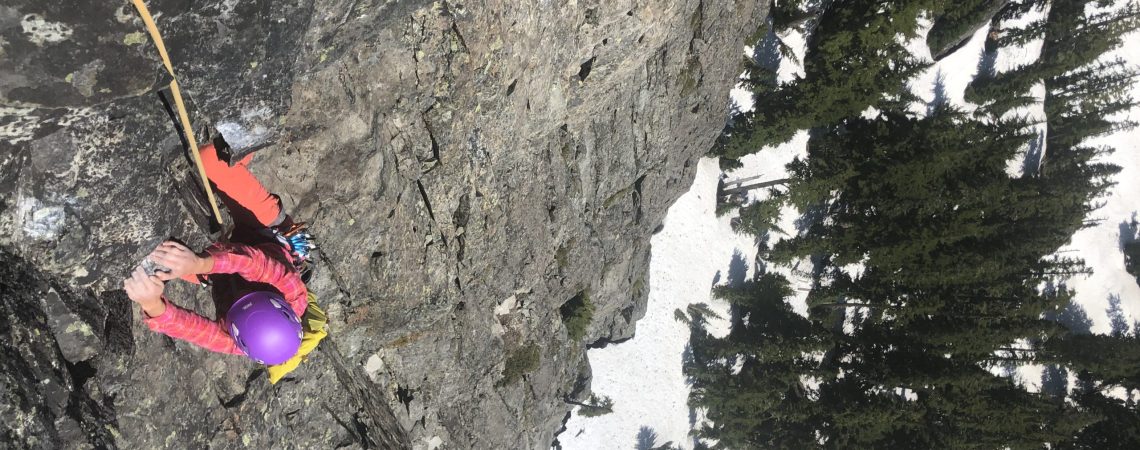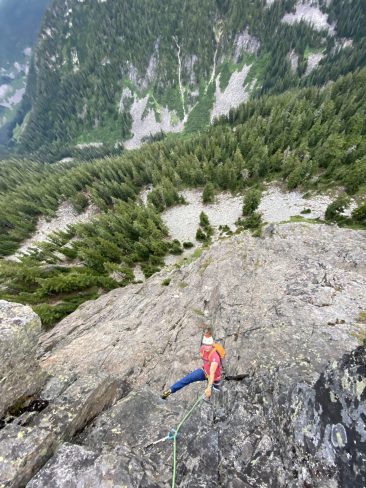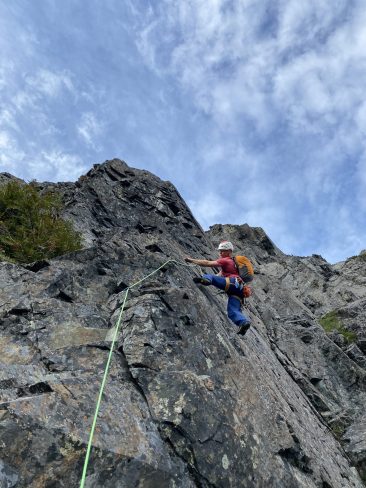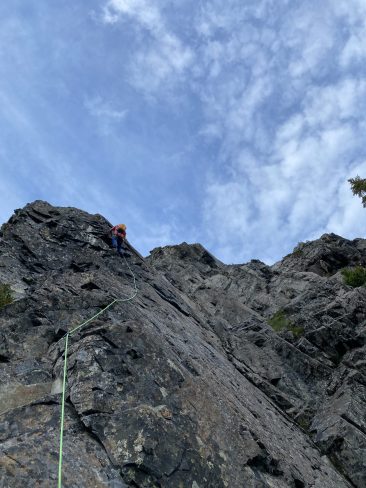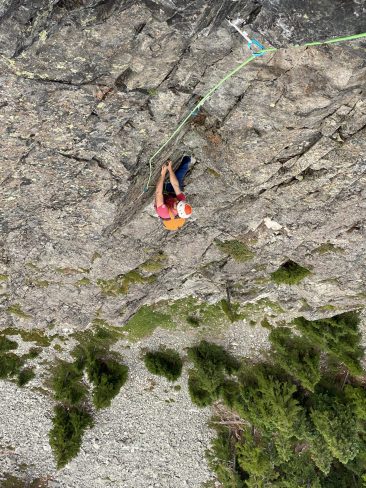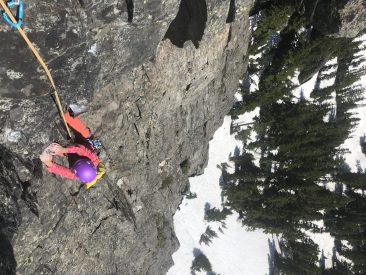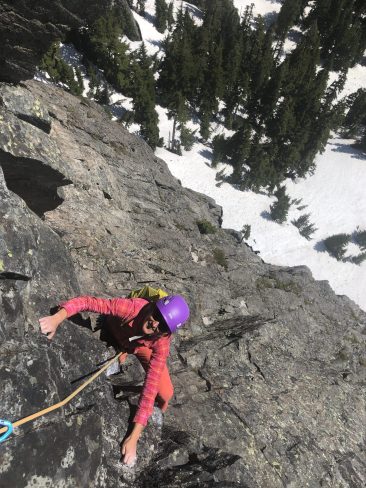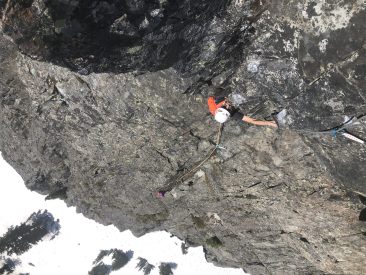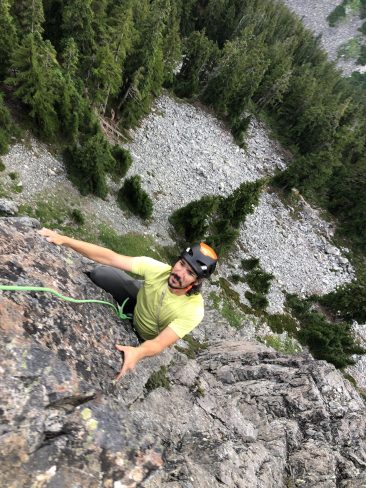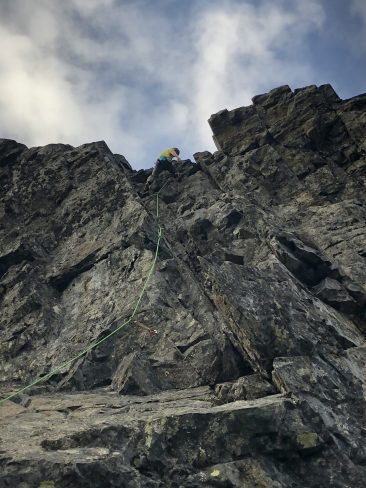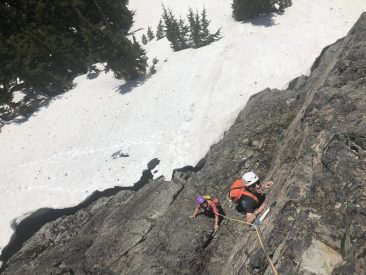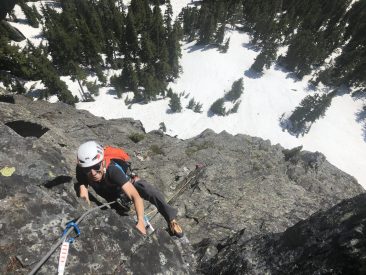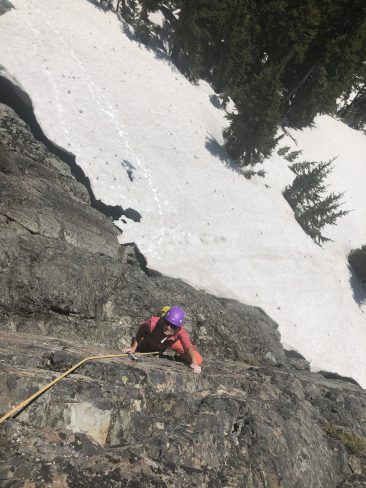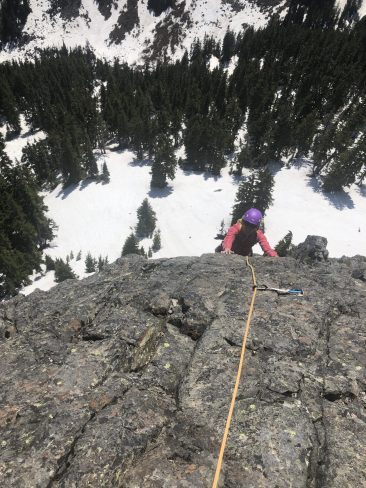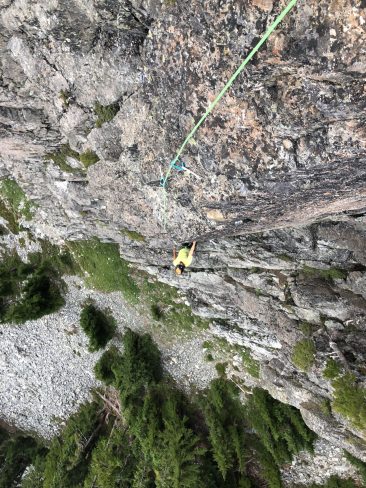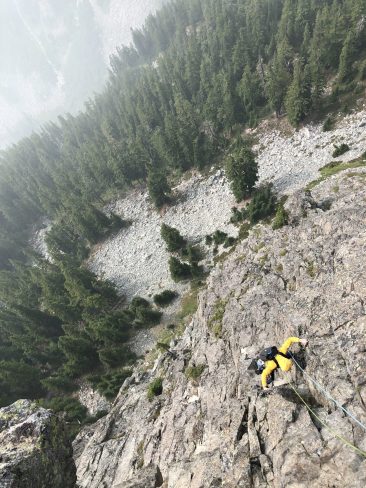Climb Tooth Fairy – A Modern Classic on The Tooth at Snoqualmie Pass. Tooth Fairy is a stellar modern route on the west face of The Tooth that blends the accessibility of a local favorite with the quality and movement of a true alpine gem. Featuring thoughtful, well-protected climbing on clean granite, this route offers a more technical and sustained alternative to the traditional South Face, while still keeping the approach short and the views big. With varied crack and face climbing, bolted belays, and a stunning alpine backdrop, Tooth Fairy has quickly become a must-do for climbers seeking a high-quality day out in the Central Cascades. Join Backcountry Adventure Guides for an unforgettable climb on this rising modern classic.
- Dates: Custom, call or email for availability
- Duration: 8 Hours
- Level: Beginner-Intermediate
- Client Ratio: 2:1
- Difficulty: II+ 5.9 (6 pitches)
- Cost:
- 1:1 $550 per person
- 2:1 $370 Per Person
- Included: Park fees, group climbing equipment, and guide services.
- Not Included: Ground transportation airfare, transportation within Seattle, hotel accommodations, restaurant meals, gratuities for guides, meals while on the mountain, and all personal items
Day 1 – 2,500′ ↑ 2,500’↓, 6~ Miles, 6-8 hours
The approach and descent from the Tooth Fairy route on The Tooth near Snoqualmie Pass involves a round-trip distance of approximately 6.0 miles with an elevation gain of about 2,500 feet.
The journey begins at the Snow Lake Trailhead in the Alpental Valley. After hiking approximately 1.6 miles on the Snow Lake Trail, you’ll encounter a turnoff toward Source Lake. From there, the path leads through talus fields and ascends steeply toward Pineapple Pass. The final segment involves navigating around the south side of The Tooth to reach the base of the Tooth Fairy route
Tooth Fairy offers six pitches of high-quality alpine rock climbing with a fun mix of face and crack moves, all in a striking alpine setting. The heart of the route features two excellent crux pitches in the 5.9 range, with engaging and well-protected climbing on clean rock. Expect thin cracks, delicate face sequences, and thoughtful gear placements, all with bolted belays for convenience. The climbing is sustained but never overwhelming, making it a great step up for those looking to progress into more technical alpine routes. With its balance of challenge, safety, and scenery, Tooth Fairy stands out as one of the best moderate alpine rock climbs in the Snoqualmie Pass area.
Our recommended clothing system has four layers.
Base layer: manages moisture and wicks perspiration away from your skin. (synthetic or merino wool)
Softshell: should be a durable, comfortable, insulating and wind/water resistant layer that breathes well.
Hard shell: windproof, waterproof and breathable. (e.g. Gore-Tex, or similar)
Insulating layer: should be down-fill or synthetic-fill and fit over all layers. (e.g. down, primaloft or polarguard)
These four layers are usually sufficient for most people, but if you tend to be colder bring one extra medium-layer that would be ideal for extra warmth around camp, such as a vest. When deciding what to pack, remember to bring enough clothes and accessories to ensure your safety and comfort, while not over-burdening yourself with items you probably won’t use.
Climbing Gear
- Climbing Helmet: Lightweight
- Rock Climbing Harness: Padded and adjustable
- Approach Shoes(After July 4th or when the now is gone)
- Rock Climbing Shoes – Snug and comfortable
- Belay Device: Tube style belay device ie .BD Guide ATC
- Nylon Slings: (1) 60 cm nylon sling, (1) 120 cm nylon sling
- 2 Locking carabiners 2-Large, pear-shaped carabiners;
- 2 Regular carabiners (e.g. Wire-gate are recommended)
Early Season
- Ice Axe Lightweight Under 5’7” use 60cm, 5’7”- 6’2” use 65cm,
- 3 Season mountaineering boots (Must be crampon compatible)
- Crampons with anti-ball plate,
- Adjustable trekking poles- optional
Upper Body
- Synthetic T-shirt
- Sun Hoodie Lightweight, light colored for sunny days
- Sports bra Two, synthetic,
- Soft Shell with hood
- Mid-Weight Down/Synthetic Jacket (with hood)
- Hard shell jacket with hood Waterproof and breathable. Gore-Tex or equivalent is best
- 1 Pair light leather palmed gloves for warmth and rappelling
- Warm hat Wool or synthetic
- Buff or Balaclava
- Shade hat or baseball cap
Lower Body
- 1 Pair soft shell pants lightweight
- Synthetic hiking socks
Backpack
- Internal frame pack 30-40 liter capacity
Miscellaneous Equipment
- Sunglasses 100% UV protection with side shields or wrap around.
- Personal first aid repair kit Basics: moleskin/blister kit, Band-Aids, first-aid tape, ibuprofen, personal medications, and batteries etc.
- Lip balm At least SPF 20
- Sunscreen At least SPF 40
- Headlamp lightweight LED
- 2 water bottles 1 liter wide-mouth Nalgene and 1 bottle holster, or
- Hydration bladder With drinking tube and 1 Nalgene bottle
- WAG Bag or toilet paper stored in a plastic bag.
- Bandana
- Hand wipes
- Favorite snack food
WHO WILL MY GUIDE (OR GUIDES) BE?
We are small company who enjoy working together in the mountains as well as highly skilled professionals who hold current Wilderness First Responder certification and are proficient in technical rescue and evacuation skills. Our guides are dedicated to the world of alpinism, many having first ascents and hold professional certifications with the AMGA in the rock, alpine, and ski disciplines. The AMGA is part of the IFMGA, which is the international body of certified mountain guides.
HOW MUCH SHOULD I TIP MY GUIDES?
Tipping is considered standard practice in the guiding industry. Tipping amounts vary – so $20-30 per day per person/per guide is average that works well for the guides without a serious blow to your wallet. Often 10% of the course cost is a good rule-of-thumb. If you feel that the program was exceptional or substandard the tip can reflect that.
CAN I RENT EQUIPMENT FROM BCAG?
No, for these trips we strongly suggest to buy your equipment due to obscenely large rental costs for trip of this length.
HOW HEAVY WILL MY PACK BE?
Day trips will keep your pack between 10-15 pounds max.
WHEN DO I NEED TO PAY THE BALANCE OF MY TRIP?
For Scheduled Domestic Courses and Climbs: Your balance is due 60 days from trip departure. Payable by check, Credit Card with service charge or Venmo.
WHAT HAPPENS IF I NEED TO CANCEL MY TRIP?
If you should decide to cancel your trip, BCAG must be notified in writing. Your trip will be cancelled from the date we receive written notice. You will be assessed a cancellation fee according to the following schedule:
90 to 31 days from trip departure – 50% of trip cost
30 days or less – 100% of trip cost
WHAT HAPPENS IF BC ADVENTURE GUIDES HAS TO CANCEL MY TRIP?
In the rare circumstance where we need to cancel a program you can reschedule without a fee or receive a refund on your deposit. If circumstances arise that force us to cancel a program that is already in progress, we reserve the right to decide whether a refund or credit, at a prorated rate, will be issued. We are not responsible for cancellation fees or costs arising from your changed or cancelled flights, lodging, or other arrangements. We strongly recommend obtaining trip cancellation insurance from your travel agent.


